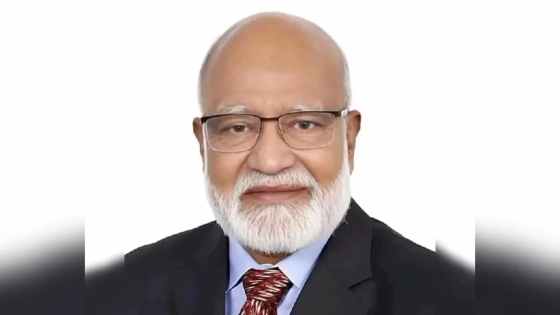
By Rumana Jaman
DHAKA, May 30, 2025 (BSS) – Bangladesh Nationalist Party (BNP) Standing Committee Member Dr Khandaker Mosharraf Hossain said Shaheed President Ziaur Rahman appeared to be a vanguard in nation’s crisis enunciating his valiant role as a freedom fighter, a great proclaimer of independence and a leader.
He said Shaheed Zia was both a brave soldier, a sector commander during the Liberation War, and ultimately was a leader who brought stability in the country, highlighting his glorious initiatives as a nation’s savior and a great leader in his life.
In an exclusive interview with the state-run news agency, Bangladesh Sangbad Sangstha (BSS), the veteran politician also recalled that amidst coups during the then Awami League’s regime and later coups and counter-coups, Ziaur Rahman reemerged as a guide of the country on November 7 through the sepoy-people’s revolution.
His journey is defined by success, and during the nation’s most crucial transition, Shaheed Zia appeared to be a frontrunner, he said.
Dr Mosharraf said his life was a remarkable journey of triumph, and during a period of national crisis, Shaheed Zia emerged as a beacon of hope for the nation.
Reflecting on the post-Liberation War period, he said several significant events were unfolded between August 15 and November 7.
“On November 3, Brigadier Khaled Mosharraf led a military coup that toppled the Khondaker Mostaq Ahmad government and placed Major General Ziaur Rahman under house arrest. Just five days later, another uprising took place—widely recognized by the people as the sepoy-people’s revolution”, he added.
Following this, Dr Mosharraf said, Shaheed Zia delivered a historic address to the nation, urging the countrymen to stay calm and united to protect Bangladesh. Subsequently, he was appointed as the Chief Martial Law Administrator by the President.
During the period, former Chief Justice Abu Sadat Mohammad Sayem assumed the Office of Presidency replacing Khondaker Mostaq Ahmad, said the BNP Standing Committee member, adding that at one stage, citing health reasons, President Sayem requested Ziaur Rahman to take over the presidency.
Dr Mosharraf termed this transition as historic, as the nation returned to multiparty democracy from one-party rule formed by Sheikh Mujib.
He said that after assuming the responsibilities of the presidency, Ziaur Rahman did not remain in power without a public mandate. Instead, he arranged a national "Yes" or "No" referendum, in which the people gave him overwhelming support.
Assuming power with the full support of the countrymen, Ziaur Rahman held a presidential election, he continued.
“In that election, the Awami League nominated General MAG Osmani as the candidate of the National Democratic Alliance, while Ziaur Rahman became the candidate of the Nationalist Front. Ziaur Rahman won a landslide victory in the election,” the BNP leader recalled with profound respect.
Mentioning that Ziaur Rahman initiated extensive programmes immediately after assuming the presidency, Dr Mosharraf asserted that he was a prudent politician and a true nationalist leader.
“Recognizing the need for both long-term planning and coordinated efforts to advance a newly independent nation, Ziaur Rahman demonstrated remarkable foresight. This vision led him to adopt a 19-point political philosophy”, he uttered.
To implement this vision, Ziaur Rahman engaged talented and professional individuals in politics, he added.
The BNP leader said Ziaur Rahman also understood that true national development would not be possible neglecting half the population— women. Therefore, the BNP founder undertook various initiatives to empower them and make women economically active, he continued.
Dr. Mosharraf stated that Ziaur Rahman gave the people of Bangladesh a clear identity — Bangladeshi nationalism, restored freedom of the press, put an end to corruption and lawlessness, and led the country towards self-sufficiency in food production.
By initiating canal excavation, he brought about a revolution in agriculture, he said.
Through the formation of BADC (Bangladesh Agricultural Development Corporation), Ziaur Rahman ensured the proper distribution of fertilizers, seeds, and pesticides to farmers, the BNP senior leader said.
Alongside reopening shuttered industries, he said the Shaheed President also spearheaded the creation of new ones, and this initiative helped turn the unemployed population into a productive workforce.
The BNP veteran leader stated that following Ziaur Rahman’s rise to power, Bangladesh was shifted from a one-party system to a multi-party democracy. The revival of multi-party politics marked a significant transformation in the country, he added.
Dr. Mosharraf defended Ziaur Rahman’s concept of Bangladeshi nationalism, emphasizing that Bangladesh is a nation of diverse communities with different beliefs and religions as their cultures and lifestyles are different.
So, Ziaur Rahman thought nationalism should be based on geographical identity of the country, not solely on language or culture, he added.
This former BNP minister observed that under Ziaur Rahman’s leadership, Bangladesh saw the establishment of its garment industry, while he was the pioneer in initiating rural electrification as a strategy for development through village-based industries. Additionally, he also founded BAPEX (Bangladesh Petroleum Exploration and Production Company), he said.
Ziaur Rahman pursued a politics of production aimed at the development of farmers and workers, and he worked to empower the youth and women of the country.
Dr. Mosharraf stated that Ziaur Rahman founded the BNP with a focus on development and production-oriented politics.
After Ziaur Rahman was assassinated, many believed that the BNP would collapse but it did not, rather in his absence, Begum Khaleda Zia took on the responsibility of leadership.
She (Khaleda Zia) led a relentless nine-year movement to overthrow the autocratic regime in an apparent uncompromised nature. There is no more such a leader in Bangladesh who has reached the helm of popularity, he added.